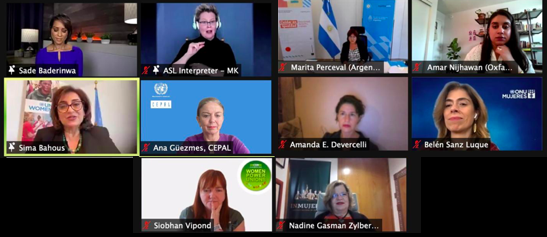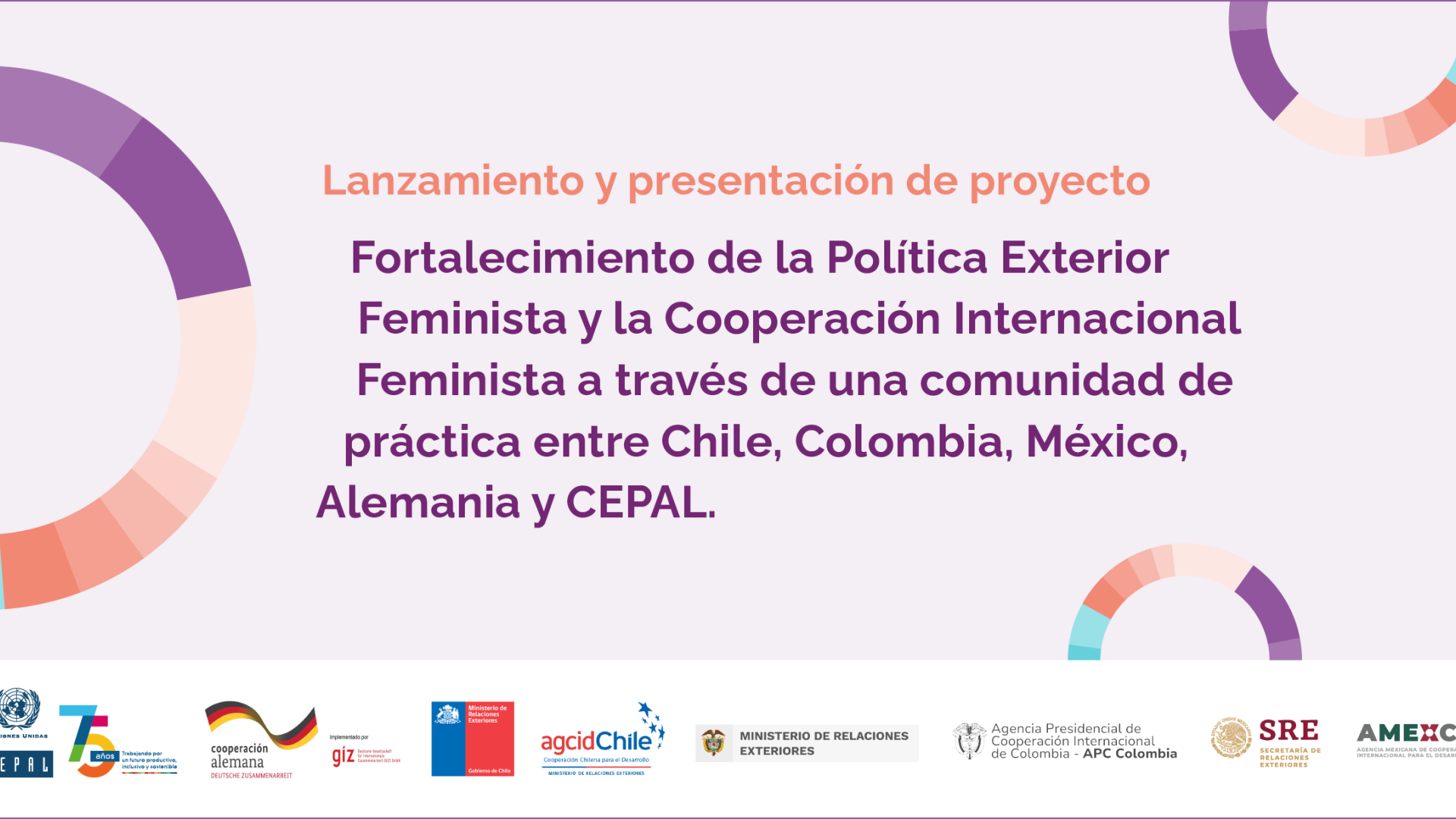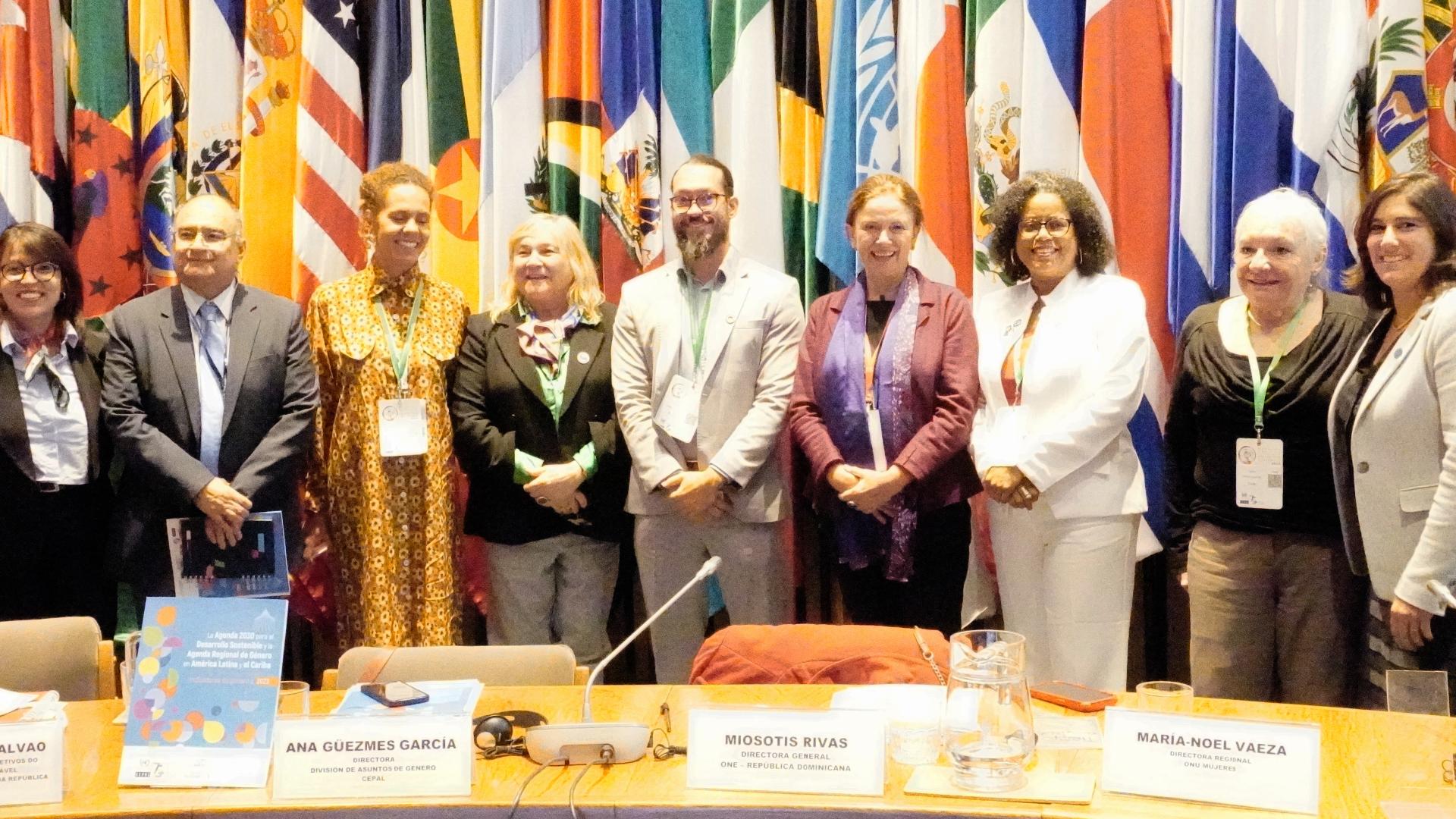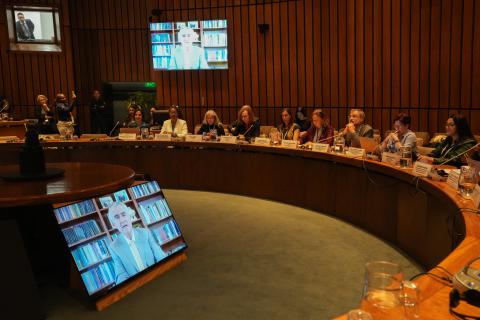Briefing note
Increased funding is needed to develop comprehensive care systems that redistribute care work more equitably between women and men, as well as between states, communities, the market, and families. There are examples of progress in the world in terms of gender equality and, particularly, in the recognition and valuation of care work. However, gaps persist, in addition to the fact that women, girls and adolescents are the most affected by the environmental, health and economic crises, as well as the crisis derived from the unfair organization of care.
These are some of the proposals shared at the side event "The relevance of care work for gender equality and action for sustainability", held in the framework of the 66th session of the Commission on the Status of Women (CSW66), which takes place between March 14 and 25 and whose priority theme is "Achieving gender equality and the empowerment of all women and girls in the context of policies and programs related to climate change, the environment and disaster risk reduction". The side event was organized on behalf of the Global Alliance for Care by the Governments of Mexico and Germany, with co-sponsorship from the Government of Argentina, UN Women, the International Labour Organization (ILO), the International Trade Union Confederation (ITUC), and Women Deliver.
At the opening, Nadine Gasman, President of the National Institute for Women of Mexico (INMUJERES), mentioned that the Government of Mexico continues to implement recovery efforts in response to the crisis caused by COVID-19, and stressed that it is necessary to contribute to the transition of the labor situation of women, always calling for decent work and emphasizing its link with gender-responsive climate action. She also stressed that Mexico and the Global Alliance for Care are working to promote sustainable care systems, whose main objective is to address the current climate crisis and contribute to the construction of healthy and resilient societies.
The President of INMUJERES reported that Mexico, as leader of the Coalition for Action, presented its commitment to comply with ILO Convention 190 on violence and harassment in the world of work, a commitment that was fulfilled with Mexico's ratification of the Convention. As stated by the ILO, "Mexico has taken a historic step in protecting the right of every person to a world of work free of violence and harassment."
The objective of the meeting was to discuss the importance of care work for gender equality and environmental sustainability. "This 66th session of the CSW takes place in a global context to face the environmental, health, economic crisis and also the crisis derived from the unfair organization of care, and we want to put gender equality at the center," said Ana Güezmes, Director of the Division for Gender Affairs. The care society is the interface between equality and sustainability, she added.
Ana Güezmes made visible women’s contributions, mainly through unpaid or precarious work, to the care of people and the protection of the planet.
- One out of every three working women in the region is employed in the care economy sector, which despite having a fundamental role in the sustainability of life, are occupations with lower income and protection.
- Women spend three times as much time as men on unpaid care work.
- Estimates of the economic value of this enormous contribution made within households, in the countries that have measured it, indicate that it would represent between 15.7% and 24.2% of GDP in the region. Women contribute about 75% of this value.
She mentioned four resources from Latin America and the Caribbean that are a contribution to the Global Alliance for Care. "Ours is the only one in which, for more than four decades, governments, the United Nations System and civil society organizations, particularly women's and feminist organizations, have met at the Regional Conference on Women in Latin America and the Caribbean to identify progress and challenges in guaranteeing women's rights and autonomy and achieving gender equality," she said. The agreements and commitments made at these Conferences nourish the Regional Gender Agenda, a profound, ambitious, and integrated road map that guides the public policies of the States and in which the right to care has been increasingly present. This will be the structuring axis of the next Regional Conference on Women, which will be held in Argentina in November and whose central theme is "The care society: horizon for sustainable recovery with gender equality."
The region also has the first binding regional treaty on the environment, the Regional Agreement on Access to Information, Public Participation and Access to Justice in Environmental Matters in Latin America and the Caribbean, known as the Escazú Agreement. This treaty puts the care of the environment from the perspective of human rights protection obligations of the countries and, particularly, the protection of environmental defenders.
Güezmes also highlighted some of the agreements made by Ministers and High Authorities at the recent 62nd Meeting of the Presiding Officers of the Regional Conference on Women in Latin America and the Caribbean. Among other issues, they called for the incorporation of gender, intersectionality, interculturality and human rights perspectives in policies and programs, with financing for sustainable development, adaptation and mitigation of climate change and disaster risk reduction. The Declaration also calls for strengthening the resilience of women, adolescents and girls in all their diversity and promoting their autonomy to respond to and recover from the impact of climate change, disasters and extreme weather events.
The other major contribution that emerged from the region, at the proposal of Mexico's National Women's Institute, in conjunction with UN Women, is the Global Alliance for Care. This is a key initiative to promote the incorporation of the care dimension into social, labor, environmental and economic policies.
The Director of Gender Affairs of ECLAC raised the need to value unpaid work and generate information linked to environmental policies. Several countries have made efforts to collect information on the distribution of care in households and the use of time by individuals, especially women, as a result of confinement measures and variations in employment.
Currently, 23 countries in the region have conducted at least one time-use measurement. In addition, 10 countries in the region have economically valued unpaid work in households and 4 have calculated the satellite account of unpaid work in households. The data collected have been key for gender analysis, for measuring all forms of work, for analyzing the link between income distribution and time distribution, and for following up on national, regional, and global commitments regarding the distribution of unpaid work.
In this regard, Güezmes called for quantification, measurement and breaking the statistical silence in order to have accurate information to help formulate public policies on care. He also stressed the need to recognize the care economy as a dynamic sector and called for financing and investing in care systems as part of the recovery. He also mentioned the importance of considering co-responsibility in care systems. She invited to create these systems with a new fiscal pact with gender equality that ensures sufficient resources.
In view of the current situation, Ana Güezmes pointed out, a transformative recovery is urgently needed that puts the sustainability of life at the center. The call is to move towards a care society that redistributes time, power and resources between women and men, and that cares for people and protects the planet. "We need a profound transformation that recognizes the link between society, economy, and environment. We need to strengthen the role of the state from a feminist perspective and put at the center what really matters: the sustainability of life. We require a change in institutions, politics, and taxation. The care society is the horizon. We are talking about a civilizational change that will undoubtedly make us better people."
For her part, Belén Sanz, UN Women Representative in Mexico, pointed out that the objective of the Alliance is to assume commitments and concrete actions for the recognition, reduction, and redistribution of domestic and care work among co-responsible actors, as well as the remuneration and representation of care workers. Belén Sanz stressed the importance of "moving towards a care society that prioritizes the sustainability of life and care for the planet, and thus strengthen the resilience of women and their communities. The COVID-19 pandemic has been forceful in revealing the centrality of care and the unsustainability of its current distribution. With the pandemic, women were the first to lose their jobs and to put their careers on hold to care for their families, their communities, and society at large."
The panel featured UN Women Executive Director, Sima Sami Bahous, who in closing the event said, “We need a holistic approach to care and climate change that prioritizes people over economic benefits, scales up gender-responsive climate action, and builds resilience to economic and environmental shocks,” emphasizing the importance of placing care work at the center of a feminist recovery of COVID-19 and ensuring that care is recognized as a right.
The conversation also featured contributions from Elena Bonetti, Minister of Family and Equal Opportunities, Italy; Maria Syrengela, Minister for Gender Equality, Greece; Karina Gould, Minister of Families, Children and Social Development, Government of Canada; Chidi King, Chief, Gender, Equality, Diversity and Inclusion Division, ILO; Siobhan Vipond, Chair of the ITUC Women's Committee and Executive Vice-President of the Canadian Labour Congress; Amanda E. Devercelli, Global Lead for Early Childhood Development, World Bank; and Amar Nijhawan, Women's Rights Policy Specialist, Economic Justice, Oxfam Canada.
The closing remarks were delivered by Maria Cristina Perceval, Secretary for Equality and Diversity Policies, Argentina; and Ilze Brands Kehris, Assistant Secretary-General for Human Rights in representation of the Office of the High Commissioner of Human Rights. The moderator was journalist Sade Baderinwa.
The speakers agreed on a call to increase funding for the implementation of comprehensive care systems, to invest in decent work for all women caregivers, to promote equitable access to care systems, to reduce the wage gaps affecting women caregivers, as well as on the need for women to be at the center of the recovery from the crisis.



